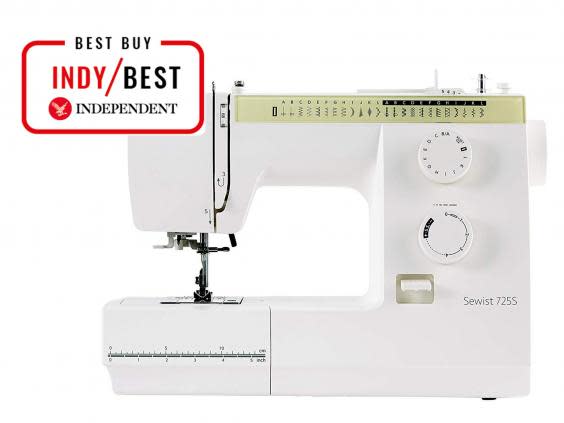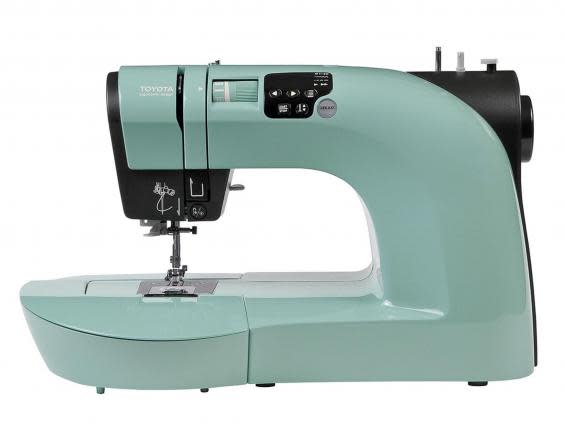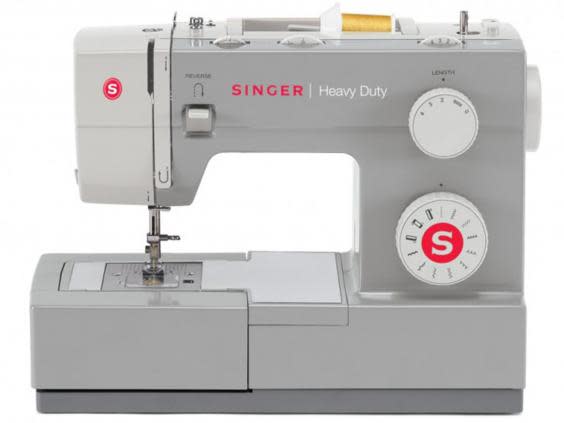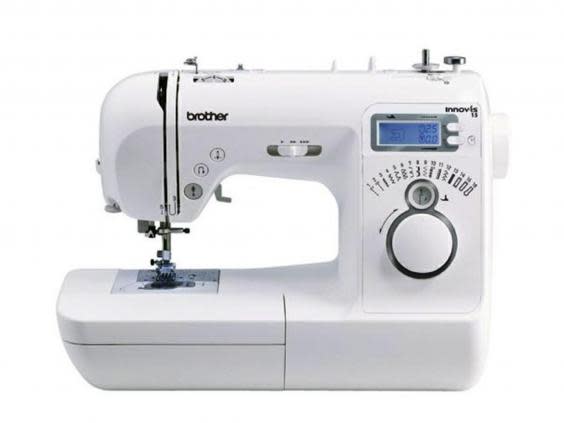8 best sewing machines for beginners
With The Great British Sewing Bee set to return to our screens in early 2019, you may be inspired to dip your toe in the waters of home sewing or return to forgotten sewing skills from earlier in life. But before you can pick up those fabric shears how do you choose your all-important sewing machine?
The vast range of confusing features on offer can be overwhelming for a beginner. To decipher which will be useful to you it is important to think about the type of projects you want to sew and how often. To get started all you need from your machine is a straight stitch in a variety of lengths, a zigzag and the function to sew a buttonhole, which most machines offer in an easier single automatic step now rather than the manual four. All other features are additional extras that may be helpful depending on whether you can see yourself making the occasional cushion and quilt or sewing yourself a whole new wardrobe.
The ability to adjust the speed of the machine, a needle up/down function and a bobbin that loads from above with a clear cover so you can see when it’s running out will be particularly useful. Features such as memory options and a lever to lift the presser foot with your knee are probably only necessary if you’re sewing more often than part-time. Most machines have feed dogs to pull the fabric through from beneath but some offer a dual feed which grasps the fabric from above too. This is handy when using tricky fabrics but certainly not essential for a beginner and you can always add a walking foot to your kit in future that will do the same thing.
A well-chosen machine can last a lifetime and we recommend investing in a sturdy model that can handle some experimentation while you flex your creative muscles. Some stitchers may feel more comfortable on manual machines which are easy to understand but others will like to take advantage of the additional features of computerised machines which can save you time and hassle when starting out. Many of these modern machines can select the optimum length and width of particular stitches for you, removing the guesswork and limiting your mistakes.
I’ve tested a wide variety of machines at various price points while making my own pieces – you can see those on my blog Diary of a Chain Stitcher – and have enlisted the advice of some of the best home sewers in the business to bring you a shortlist of machines which should help you find your ideal match.
You can trust our independent reviews. We may earn commission from some of the retailers, but we never allow this to influence selections, which are formed from real-world testing and expert advice. This revenue helps us to fund journalism across The Independent.
Janome 725S Sewing Machine: £259, Amazon

This recently released machine ticks all the boxes for a beginner with the desire to sew a varied range of projects and explore new skills. Straightforward to use with three dials to select stitch type, length and width and robust enough to cope with anything you throw at it. This is the model used by contestants on the upcoming series of the GBSB and is very similar to the machine I learnt on and still use.
The set up will feel familiar to anyone who has done a bit of sewing on traditional manual machines in the past with the added bonus of a drop in bobbin, needle threader, one-step buttonholes and good range of included feet and accessories.
John Lewis & Partners JL111 Sewing Machine: £109, John Lewis & Partners

If you’re on a budget, this basic machine will do the job very nicely. The 14 stitch options are plenty for most of projects and the classic set-up means you can get sewing quickly. Best for sewing light to mid-weight woven fabrics this will be great for alterations but not ideal if you see yourself progressing on to more complex projects like jeans.
Disadvantages are a lack of stitch width selection and front loading bobbin which can be tricky to access if you get in a tangle but it’s a very sturdy machine for the price. There are two floral prints to choose from and the original JL110 has all the same features in a range of plain colours for £99.
Brother XN1700 Sewing Machine: £119, John Lewis & Partners

A fantastic starter machine with many similar features to the JL111 but with the bonus of a top-loading bobbin with view-through cover, included zip foot and a few extra stitch styles to choose from. It is easy to set up, understand and thread and sews smoothly with a great finish. The automatic thread tension will be a big plus for beginners and the base that comes away to reveal the slim ‘free-arm’ is useful for sewing cuffs and trouser hems.
However, it feels less substantial than other models on the shortlist and it doesn’t cope so well with thick fabrics so if curtains and similar home decoration items are on your list this may not be the machine for you.
Toyota Oekaki Renaissance Sewing Machine: £389, John Lewis & Partners

If you’ve got big sewing dreams this is a machine that will grow with you. It doesn’t lack in features or stitch options with 50 built in. If machine embroidery interests you then you will be delighted by the Oekaki mode (meaning ‘to draw’) in which the stitch width is controlled by pressure on the foot pedal.
We were impressed by the machine’s ability to handle thick fabric, up to 12 layers of denim with thick thread. It has a unique shape and clever design with storage for the foot pedal in the back of the machine and the substantial size of the removable base provides a larger than usual working area around the footplate which might help beginners with accuracy.
Singer 4411 Heavy Duty Sewing Machine: £209, Amazon

As the name suggests, this is a sturdy piece of kit that handles heavier upholstery fabrics, denim, leather and vinyl like a dream. A wonderful choice if you’re intending to mainly sew for home decoration projects. It stitches smoothly and can still be used for delicate and lightweight fabrics, but it does sew at some speed so that might put off beginners wanting to sink their teeth into intricate projects.
Other entry-level manual Singer models felt a little flimsy so the metal frame and components were a pleasant surprise and the stitch quality and ease of use surpassed our expectations when tested.
Brother Innovis NV15 Electronic Sewing Machine: £239, Amazon

Having learnt on a manual machine, I didn’t see myself getting on with a computerised model but this is the machine that changed my mind. We thought all the features might be too confusing for a beginner but found it very intuitive when we tried it out.
The 16-stitch options, including stretch stitches, are selected with a simple jog dial and it has all the electronic essentials with a stop/start button, speed limiter, needle threader and needle up/down control. Threading is so easy – the machine even pulls the bobbin thread up for you. A great choice for your first computerised machine.
Bernina 330 Sewing Machine: £599, Amazon

This is one of the entry-level models from Bernina and while expensive for a first machine it is worth the investment for reliability which should last a lifetime. Many professionals won’t consider anything but Bernina. This particular model feels less complex than some of the other computerised machines and sews fabrics from fine silks to thick wool coating smoothly and accurately.
We particularly liked the memory function, which enables you to save your favourite or most frequently used stitch combinations so they are ready at the touch of a button. It can sew a top quality automatic buttonhole and is easy to thread but additional feet and accessories can be expensive.
Pfaff Smarter 160s Sewing Machine: £219, Amazon

Another favoured brand amongst experienced dressmakers, the Pfaff Smarter range provides a more affordable option for home sewers. For the price, we were impressed by the variety of features, including an integrated needle threader and automatic buttonhole. You can also adjust the position of the needle which is great for accurate topstitching.
The design is well thought out for beginners with snap on Pfaff feet and the colourful smart grip dials for adjusting stitch styles are a nice touch. It is lightweight and comes with a hard case so we’d also recommend it as a travel machine for more advanced sewers looking to add to their collection.
The verdict: Sewing machines for beginners
The Janome 725S stands out as a strong, straightforward all-rounder that strikes a good balance between overly complex and too basic to cope with more challenging projects as you improve. Great value for money for a machine which will last.
If you like the idea of a computerised machine, we were impressed with the Toyota Oekaki Renaissance. It has the versatility to satisfy a more advanced sewer but is intuitive enough for a beginner to use with ease.

 Yahoo News
Yahoo News 
